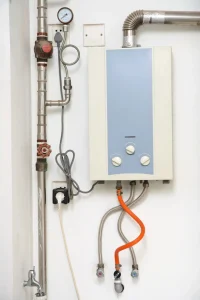When it comes to providing your home with reliable hot water, choosing the right water heater is a crucial decision. With advances in technology and an increasing emphasis on energy efficiency, today’s market offers a wide variety of water heaters, each with its unique benefits and features. As a responsible homeowner, it’s essential to explore your options and make an informed decision that best suits your needs, budget, and home infrastructure.
In this comprehensive guide, we will help you navigate the world of water heaters by shedding light on various types, ranging from traditional tank-based models to energy-efficient tankless and heat pump systems. We will discuss the key features, benefits, and drawbacks of each type and guide you in determining the most suitable option for your home. By delving into fuel sources, capacity, efficiency, installation, and maintenance requirements, our expert analysis will empower you to make an educated decision about this vital home appliance.
Traditional Tank-Based Water Heaters: Tried and True Performance
Tank-based water heaters have been the go-to choice for many households for decades. They store and heat large amounts of water in an insulated tank, ensuring hot water is readily available when needed. Here are the pros and cons of this popular option:
1. Fuel sources: Tank-based heaters can be powered by natural gas, propane, or electricity, offering flexibility in choosing the most suitable and cost-effective source for your home.
2. Affordability: These water heaters tend to be more affordable upfront but may have higher energy costs over time due to heat loss from the stored water.
3. Capacity: Tank sizes vary, typically ranging from 20 to 80 gallons, allowing you to choose the right capacity for your household’s hot water demands.
4. Simpler installation: Traditional water heaters usually have straightforward installation requirements, making them a more accessible choice for many homes.
Despite their widespread use, tank-based water heaters have some drawbacks, such as limited hot water availability and shorter lifespans compared to other types.
Tankless Water Heaters: Energy Efficiency and On-Demand Convenience
As the name suggests, tankless water heaters do not store hot water; instead, they heat water on demand as it flows through the unit. This innovative technology brings several benefits and features:
1. Continuous hot water: With no storage limitations, tankless water heaters provide a constant supply of hot water as needed.
2. Energy efficiency: By only heating water when required, these systems can significantly reduce energy consumption, leading to lower utility bills.
3. Space-saving design: Without a bulky storage tank, tankless heaters can be installed in smaller spaces, making them suitable for homes with limited room for appliances.
However, there are some considerations to take into account, including higher upfront costs, more complex installation, and a potential need for multiple units to meet high hot water demands.
Heat Pump Water Heaters: Eco-Friendly and Cost-Effective
Heat pump water heaters use advanced technology to transfer heat from the surrounding air or ground to heat water, making them one of the most energy-efficient options on the market. Key features and benefits include:
1. Energy efficiency: By leveraging existing heat sources instead of generating new heat, these systems offer considerable energy savings, resulting in lower utility costs.
2. Environmentally friendly: With reduced energy consumption and greenhouse gas emissions, heat pump water heaters are an eco-conscious choice for homeowners.
3. Versatile installation: Some models work in tandem with existing water heaters, while others come as standalone integrated systems, offering flexible installation options.
However, heat pump water heaters have some disadvantages, such as higher initial costs, specific climate requirements for optimal performance, and the need for occasional defrosting in cold environments.
Solar Water Heaters: Harnessing the Power of the Sun
Solar water heaters utilize energy from the sun to heat water for your home. By integrating renewable energy, they offer both economic and environmental advantages:
1. Renewable energy: By harnessing solar power, these systems rely on a clean and abundant energy source that can significantly reduce your carbon footprint.
2. Cost savings: While initial costs may be higher, solar water heaters can provide long-term savings on energy bills thanks to their reliance on free solar energy.
3. Rebates and incentives: Many areas offer tax rebates and incentives for installing solar water heating systems, making them a more affordable option in the long run.
Drawbacks of solar water heaters include the need for ample sunlight exposure, the requirement for a backup energy source for cloudy days, and more complex installations involving solar panels.
Making the Right Choice for Your Home
As we’ve explored, there are various water heater options available in today’s market. Each has its unique combination of features, benefits, and considerations. The key to making the right choice for your home lies in understanding your hot water needs, budget, and preferred energy source. By weighing the pros and cons of each type, you’ll be well on your way to selecting the perfect water heater for your household.For professional guidance and expert assistance in choosing, installing, and maintaining the ideal water heater for your home, rely on our skilled and experienced team at North Star Plumbing. We’re committed to providing exceptional water heater repair in McKinney and unmatched expertise to help you enjoy a reliable and efficient hot water supply for years to come. Contact us today to discuss your water heating needs.

